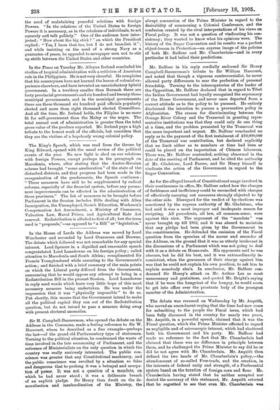Sir H. Campbell-Bannerman, who opened the debate on the Address
in the Commons, made a feeling reference to Sir W. Harcourt, whom he described as a fine example—perhaps the last—of the grand old Parliamentary type of statesmen. Turning to the political situation, he condemned the waste of time involved in the late summoning of Parliament, and the reticence of Ministerialists on the only question in which the country was really anxiously interested. The public con- science was greater that any Constitutional machinery, and the public conscience was revolted by a situation so false and dangerous that to prolong it was a betrayal and usurpa- tion of power. It was not a question of a mandate, on which he had never stood ; it was a deliberate breach of an explicit pledge. Sir Henry then dwelt on the de- moralisation and insubordination of the Ministry, the
abrupt conversion of the Prime Minister in regard to the desirability of summoning a Colonial Conference, and the confusion created by the rival interpretations of his views on Fiscal policy. It was not a question of vindicating his con- sistency; they wanted to know what his opinions were. The history of the Sugar Convention and its results was a perfect object-lesson in Protection—an express image of the policies of both Mr. Balfour and Mr. Chamberlain—and in every particular it had belied their predictions.






































 Previous page
Previous page